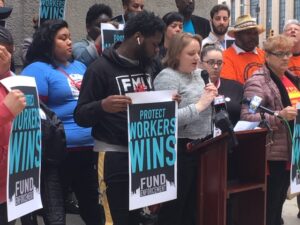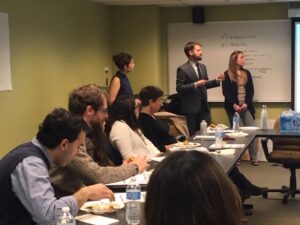Philadelphia has legal protections for low-wage workers on the books, including paid sick leave and an ordinance to address wage theft. The problem, however, is that these legal protections for low wage workers do not amount to much if they are not actually enforced. Representing the Sheller Center, Lily Austin (’20) spoke at a press conference at city hall about the need for sufficient funding, particularly to educate workers and employers about these laws. She explained how the city cannot sit back and wait for complaints to come. Rather, the city needs to work in active partnership with community groups, who already have the trust of these workers, by providing sub-grants to community-based organizations to educate low-wage workers. It must also work cooperatively with communities to proactively target employers or industries who are likely to be violating the laws.


 ether with the
ether with the